- Home
- Fredric Brown
The Far Cry Page 3
The Far Cry Read online
Page 3
He dressed and drove in to Taos—Seco is too small to have a restaurant—and the drive gave him enough appetite to enable him to eat a good breakfast and feel better.
At the post office there was a letter waiting from Vi:
Dear Georgie—[He hated being called Georgie and had managed to break Vi of the habit of doing it verbally, but she still wrote to him that way whenever they were apart]
Im glad you found a place you like and hope your feeling good by now, I wish it had been Santa Fe because we both lived there and liked it once and had friends there, I guess it was mostly your friends but if Taos is what you want its all right by me, I dont know just yet what day I will come but it will be about a week yet and Ill write again and let you know in a few days, meanwhile the girls are fine . .
She always wrote that way, one running sentence to a letter no matter how many subjects she covered, and she always left out the apostrophes in her contractions. Weaver had often thought that possibly they’d never have been married if they’d corresponded before the ceremony. Errors in grammar and spelling and punctuation always irritated him more than they really should; he knew that it amounted almost to a phobia with him, but he just couldn’t help it. Vi hadn’t had much education and she’d been working as a waitress when he'd met and married her, and there’d been nothing he could do about it. He'd tried at first to talk her into taking some classes at night school, but during the first year of their marriage it hadn’t bothered him too much—there'd been passion as against grammar and after the birth of Ellen he’d given up. Vi would always be ignorant and a little stupid—and basically, he'd decided, it was the stupidity that annoyed him more than the ignorance. Many poorly educated people have keen minds; some have that rarer quality, good taste. Vi had neither, and no amount of education would have given them to her.
He sighed, as he put the letter in his pocket, and wished again that she wasn't coming. But providing separate maintenance for the two of them for all summer, in addition to the cost of keeping the girls in camp, would be much more than he dared risk spending; he had to hang onto enough capital to finance a fresh start for himself in business in the fall. Now that he had acquired a place big enough for them both to live in-and had, in effect, paid his rent in advance for the summer, there wasn't any choice in the matter. Besides, they had already, before he'd left Kansas City, given notice on their flat for the first of June and had made arrangements to store the furniture. If Vi didn’t come here, she’d have to stay at a hotel or rooming house; he’d have a hell of a time talking her into doing that, especially now that he’d already told her that he had a three-room place paid for, for the summer.
No, there wasn't any out, now.
The weather stayed bright and warm, except for the evenings, and the mountains stayed beautiful. No rainy, or even cloudy, days. Weaver painted, and the results weren't too bad, although his further efforts didn’t seem to get any better than his first ones had been, and occasionally they were worse.
He read and walked and ate and slept and drank. Sometimes there was lonesomeness, but against it a strong basic urge to be alone that kept him from trying to make friends.
He didn’t do too badly; he was drinking too much he knew, but at least he learned to avoid, for a while, doing any drinking till after dark. And he rationed his days to keep him going until then; after that there seemed nothing to do but try to read—sometimes he could concentrate enough to enjoy reading and sometimes he couldn’t—and to drink until he got tired enough to enable him to sleep.
Whisky was getting to be a bit expensive, though, and he switched to wine, at least for the drinking he did at home. Prices of most things, he was learning, were higher in Taos or Seco than they’d been at home in Kansas City. Rent and clothes were all one could save on—clothes not because they cost less but because there was no need of wearing good ones; denim trousers and wool shirts were almost a costume. He’d been wondering whether to write to Vi again while he was waiting to hear from her, and finally decided to do so mostly to tell her to bring more of his old clothes along so he could save by wearing them out during the summer. And he told her not to spend too much for additions to her own wardrobe; she'd need cool things for the daytime and warm ones for the evenings, but they needn’t be new or expensive things.
He found a practical use, finally, for the water colors; he composed a long letter to the girls that was only half writing, which Vi would read to them, and the other half little pictures in bright colors, of mountains and adobe houses and animals and Indians, They weren’t good pictures, especially, but Ellen and Betty would get a big kick out of them and would think their father was a real artist.
The next day was a Sunday, and the post office wasn’t open, nor were the taverns and liquor stores. It was a bad day; he slept till noon after having drunk too much once more and after having stared too much at the blackness through the windows until some small, and unremembered, hour of the night. He awoke needing a drink, and there was nothing left. He drove into Taos to get himself a drink to pick him up before he remembered the Sunday closing law. He drank a lot of coffee and it helped a little, but not much.
The sun was bright and beautiful as he drove back home but he saw the mountains and the scenery with a weary eye; he thought, the hell with it, what is scenery? It’s like a book, possibly wonderful and magic the first time you read it, but can you keep on reading and rereading it indefinitely?
He tried to paint; he tried to read. Finally the day passed, and the evening, and he was able to go to sleep by midnight.
Monday was better, He woke without a hangover and at eight o'clock. He got his breakfast and wandered out into the bright morning, and things were good again.
But not too good. Sometime late this week or early next week Vi would be coming, and there are worse things than being bored or a little lonesome occasionally. The constant and unavoidable presence of someone who grates upon you is worse than solitude can ever be.
And aren’t we all lonely, always? What the hell had Luke Ashley meant by a Lonely Heart murder?
He drove into Taos early in the afternoon because it was time for him to pick out and send a birthday present to Betty. He found a truly beautiful Indian doll that he knew she’d love; it cost about twice what he'd intended to spend, but he bought it and arranged to have it sent.
At the post office there were two letters for him, neither from Kansas City. One was from a friend in Santa Fe whom Luke Ashley also knew; Luke had given him Weaver’s address. It suggested that he drive down for a week end there, even if he intended to spend the summer in Taos. Will Fulton. Weaver remembered Fulton too vaguely to want to spend a week end with him or even to drive seventy miles to see him.
The other letter was from Luke Ashley, on stationery of the Biltmore in Los Angeles. He stepped into the bar at La Doña Luz and ordered himself a drink before he opened it.
He glanced again, first, at the letter from Will Fulton.
"It’d be hell, George, to have you so near and not get a chance to see you at all. Some of us might drive up but Luke didn’t know just where you’d be living, so . . .”
Mentally, Weaver thanked Luke for that; Luke had recognized that he might not want to see anyone from Santa Fe.
"All the old gang will be glad . . .”
To hell with the old gang, he thought. He hadn’t seen any of them for six years and he didn’t want to now. He crumpled the Santa Fe letter and tossed it into the open fireplace. His drink came and he took a sip of it and then opened Luke’s letter:
Hope you're not yet bored in your lonely retreat. I told a few people in Santa Fe—I stopped over there that night after I left you—that they could reach you through the Taos post office, but didn’t tell them where you’d be living, so they wouldn't bother you in case you didn’t want company. Or are you getting bored by now?
If you are, why not take my suggestion and do a little digging in on the Jenny Ames murder? There’s even more reason for it now. I
just got a letter from my best market telling me that they’re starting a series of Lonely Heart murder cases—there have been quite a few of them—and the Jenny Ames deal would fit in beautifully.
If you can dig up enough data to let me do five thousand words on it, pay three hundred bucks extra for photographs, and you can at least take pictures of the place where it happened and if you do all the leg work and I do all the writing I’ll split even with you. Don’t sneeze at a hundred and fifty bucks if it’s something you can pick up in your spare time. And I know you're not supposed to work, so if this turns out to be work, drop it. You just might get interested in doing it and find out that it's fun instead. It wouldn’t be for me, but then this is my racket and it's not yours and playing the other man’s game turns out to be fun, while it's new, surprisingly often. Whenever you feel up to it, give it a whirl and see how it goes. If you can get enough dope at all, you should be able to do it in your spare time in a week. Don’t forget the pictures-if you get enough good ones, that'll run your take up maybe another fifty bucks, which will be all yours. Picture of the house, one of the place where the girl was buried, maybe a picture of the boy who saw the start of the crime those you can take yourself. Maybe you can dig up a picture of whoever was sheriff at that time and worked on the case. . .
Weaver had another drink and thought it over.
Why not? he wondered. After all, a hundred and fifty bucks was nothing to be sneezed at if he could get it just for asking questions of a few people and forwarding the data to Luke. And he had a camera that was good enough to take the pictures that might run his share up to two hundred dollars; he’d forgotten to bring it with him to New Mexico but he could write Vi to bring it with her luggage. And he could tell her to bring his portable typewriter, too.
When he'd finished his drink he went back to the post office and bought two airmail postcards. He used the desk there to address and write them, one to Vi telling her to bring the camera and the typewriter, one to Luke, "Okay, will do .” He mailed them.
He felt more cheerful than he’d felt for several days. Investigating a murder—even an eight-year-old one—would give him something to do and might be interesting. And earning a hundred and fifty or two hundred dollars would definitely be a good idea, especially at something so far from his usual occupation that it could hardly be classed as work.
He celebrated his decision by having a good dinner in Taos.
It Was getting dark when he got back into his car and drove toward Arroyo Seco.
Darker than he dreamed.
Chapter Three
He wasn't in any great hurry to get home, and, as he neared the little town, it came to him that there was no time like the present for starting what he’d decided to do. He stopped at the house of Mr. Sanchez.
Sanchez answered his knock at the door. When he saw who it was he smiled broadly and gestured with his hand. "Come in, Mister Weaver, come in, please."
Weaver went in. The place was smaller than his own but there were about a dozen children of all ages playing on the floor, doing homework at a table, three of them helping Mrs. Sanchez, who was washing dishes in a huge dishpan. But the room was amazingly quiet.
Twenty-four eyes, all of them dark, focused on Weaver, who stood uncomfortably, his hat in his hand, just inside the door.
Sanchez said, "Please to come this way, Mister Weaver." He led Weaver through a doorway to the right and into a small parlor, furnished with a splendor far beyond the room through which they had just passed. Weaver looked about him, torn between admiration and amusement. The room was spotless, but side by side with a beautiful example of native blanket weaving was a hideously gaudy pillow, "Souvenir from Denver." Next to a hand-carved santo that might have been a hundred or two hundred years in age sat a ceramic Doñald Duck. Half of the furniture was locally handmade—the heavy, sturdy Spanish-American style that is so beautiful in its functional simplicity—and the other half was an assortment of cheap and flimsy mailorder stuff; from its placement there could be little doubt of which half the Sanchezes were most proud.
Weaver was motioned courteously to a fancy but uncomfortable-looking chair that was obviously in the mail-order category. "Please to sit down, Mister Weaver."
"Thanks." Weaver sat down a bit stiffly, wondering how to begin to explain his errand. None of the others had followed them into the parlor; he decided that the room must be a sanctum sanctorum, and probably for men only. But the door had been left open and, sanctum or not, wide eyes in the other room sought vantage points for staring in at him.
But none of the children in the other room, he had already decided, could be Pepe. Pepe, if he’d been ten years old eight years ago, would be eighteen now, and there had been no boy older than fourteen or fifteen.
Looking at the doorway, which he was facing, Weaver smiled at one little girl and she smiled back shyly. He felt more comfortable and less out of place after that. He nodded toward her and said, "I've got a little girl just about her age, and another a year and a half older."
"They come here with your wife, Mister Weaver?"
“Not this summer. They’ll be at a girls’ camp back East." It seemed strange to refer to Kansas as the East, but that’s how Sanchez would think of it.
Sanchez nodded and said, "Yes, Mister Weaver," and then there was a moment’s silence; Weaver realized that it was up to him to broach the object of his visit. No matter how long he waited, Sanchez would be too polite to ask. He cleared his throat and wondered where to start, and then realized that the simple truth was the best approach.
He told Sanchez that a writer friend of his had asked him to get details about the murder of Jenny Ames so he could write a story about it.
Sanchez nodded politely again. "You want to talk to Pepe then, huh? My boy who saw them? Pepe is at the dance. I will send Luis for him, Mister Weaver." He looked toward the doorway and spoke into the silence beyond it. “Luis, you will bring Pepe home. Quick."
The boy who looked to be about fourteen started toward the outer door.
Weaver said, "Wait, please,” and as the boy paused, he tuned to Sanchez. "Please don't pull your son away from a dance, Mr. Sanchez. There's no hurry about this. I can talk to him tomorrow, any time."
Sanchez gestured deprecatingly. “It’s not matter, Mister Weaver. The dance it is not for an hour yet. Pepe he left early. He watches the others play pool or maybe Pepe he plays himself. It will not hurt him to come. The poolroom and dance hall are very near. Five minutes it will take to come. Go now, Luis."
It was so definite that Weaver didn’t protest further.
While they waited, Weaver said, "Of course I’d like to hear from your son just what he saw that night. But, even besides that, I'm really starting from the beginning. I don't even know yet who or what Jenny Ames was. Or anything about the man who killed her—except that his name was Nelson—or why he killed her. I'm sorry, but I'm afraid I wasn’t interested at the time you started to tell me about it. Would it be too much to ask for you to give me the background before Pepe comes?"
"What I know, Mister Weaver. It is little. Nobody knows much. Besides my Pepe, one woman in Taos, she saw Miss Ames while she is alive. She is the only one. Mister Nelson he lived there one month only. He stay alone. Nobody know much about him but he paint pictures. A few times I saw him in the store in town, in Seco. That is all."
"Why did he kill her?"
Sanchez shrugged broadly. "Some say he was crazy, some say he kill her for money she bring when she come to him. She come on the bus from Santa Fe the day he kill her.”
“From Santa Fe?" Weaver echoed. It gave him a little turn to remember that, since this had happened eight years ago, he’d been in Santa Fe then. He’d spent five years there, up to six years ago when he and Vi had moved to Kansas City.
"Not from Santa Fe she started. They—how do you say?—trail her back to Albuquerque, she stay at hotel there the night before. Before that—?” He shrugged. "Here comes Pepe now, I think.”
> Weaver hadn’t heard anything, but the door opened and Luis came back in, after him a tall, dark and very handsome young Spanish-American. He looked queryingly through the door into the parlor and Sanchez said, "Come in, Pepe. This is Mister Weaver, who has taken the house where Mister Nelson lived. He wants to ask you about what you saw that night. He will write the story about it.”
Pepe Sanchez came into the room and Weaver stood and put out his hand; he thought there was a momentary hesitation before Pepe took it.
"What do you want to know?" The young man's voice was faintly sullen,
"Well just what it was that you saw, Pepe. But, unless you’re in a hurry to get back to the dance, may I ask you to come out with me to the place where it happened? That way you can show me just where you were standing and tell me what you saw, right from where you saw it. My car’s right outside; take only a few minutes to get there and I’ll drive you back, of course.” He looked at Sanchez. "And if you'd care to come along, Mr. Sanchez, I'd like to offer you both a drink while we’re at my place."
Sanchez smiled and bobbed his head. "Thank you. We will be glad.”
He seemed to take Pepe's consent for granted and, after a momentary hesitation, so did Weaver. They went through the crowded room and Sanchez opened the door and held it politely.
Weaver, not to be outdone, went to the wrong side of his coupe and ceremoniously held the door open for Sanchez and Pepe before he went around to the other side and got in under the wheel.
He drove the mile and a half to his house, used the little bridge to drive onto and back away from so he could park the car facing back toward Arroyo Seco. They got out.
"Now, Pepe," Sanchez said. “Tell to Mister Weaver."

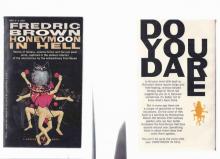 Hall of Mirrors
Hall of Mirrors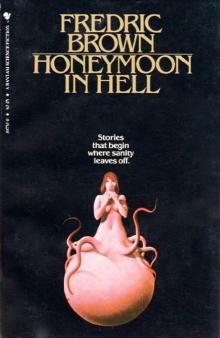 Honeymoon in Hell
Honeymoon in Hell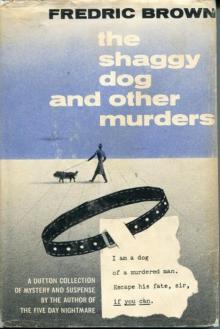 The Shaggy Dog and Other Murders
The Shaggy Dog and Other Murders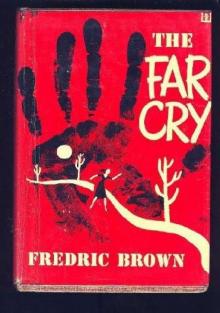 The Far Cry
The Far Cry Arena
Arena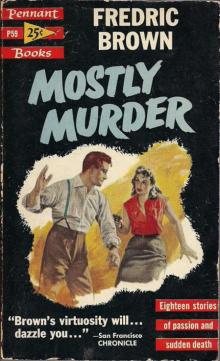 Mostly Murder
Mostly Murder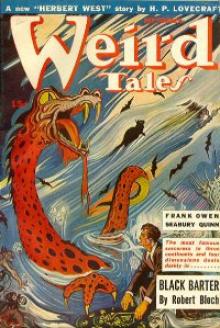 The Geezenstacks
The Geezenstacks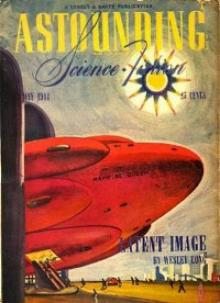 The Yehudi Principle
The Yehudi Principle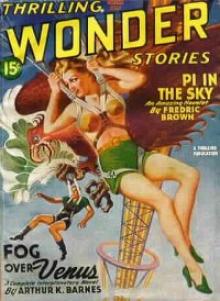 Pi in the Sky
Pi in the Sky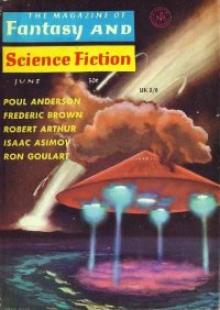 Eine Kleine Nachtmusik
Eine Kleine Nachtmusik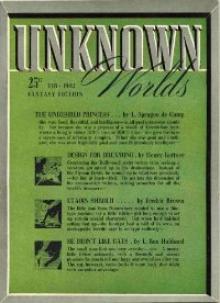 Etaoin Shrdlu
Etaoin Shrdlu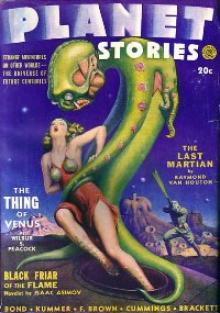 The Star Mouse
The Star Mouse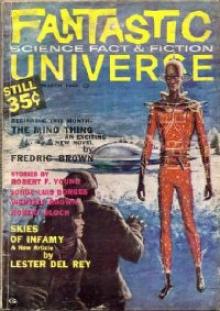 The Mind Thing
The Mind Thing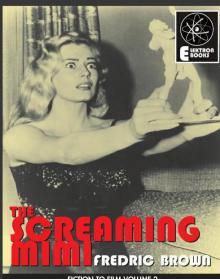 The Screaming Mimi
The Screaming Mimi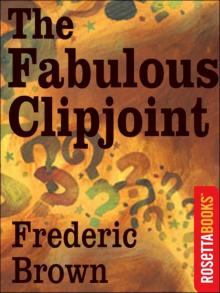 The Fabulous Clipjoint
The Fabulous Clipjoint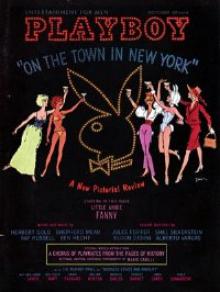 Puppet Show
Puppet Show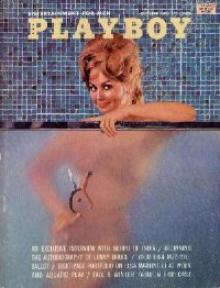 It Didn't Happen
It Didn't Happen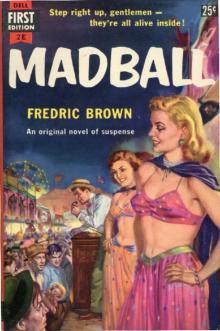 Madball
Madball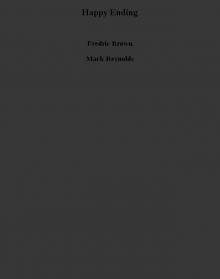 Happy Ending
Happy Ending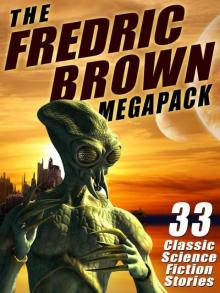 The Fredric Brown Megapack: 33 Classic Science Fiction Stories
The Fredric Brown Megapack: 33 Classic Science Fiction Stories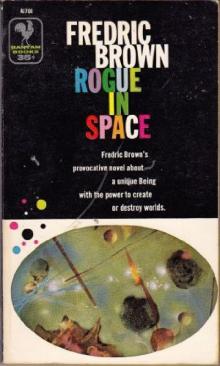 Rogue in Space
Rogue in Space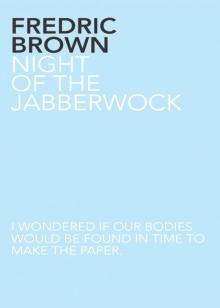 Night of the Jabberwock
Night of the Jabberwock The Dead Ringer
The Dead Ringer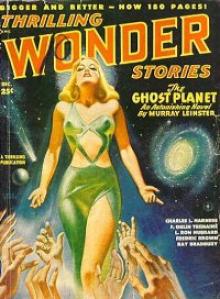 Knock
Knock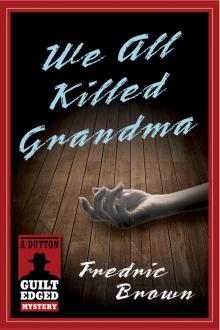 We All Killed Grandma
We All Killed Grandma Space On My Hands
Space On My Hands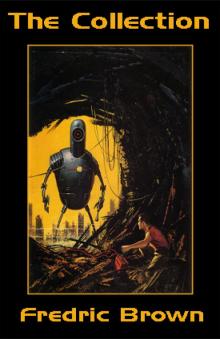 The Collection
The Collection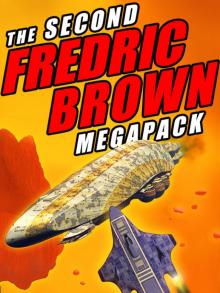 The Second Fredric Brown Megapack: 27 Classic Science Fiction Stories
The Second Fredric Brown Megapack: 27 Classic Science Fiction Stories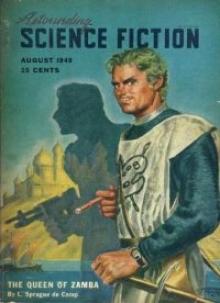 Letter to a Phoenix
Letter to a Phoenix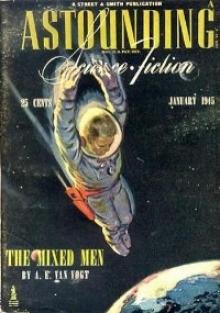 The Waveries
The Waveries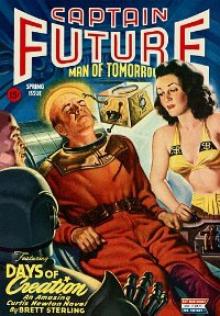 Nothing Sirius
Nothing Sirius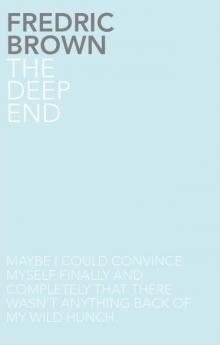 The Deep End
The Deep End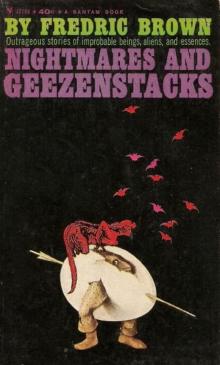 Nightmares & Geezenstacks
Nightmares & Geezenstacks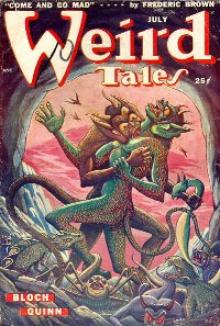 Come and Go Mad
Come and Go Mad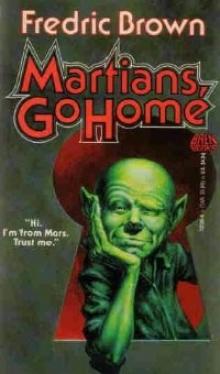 Martians, Go Home
Martians, Go Home